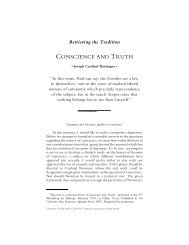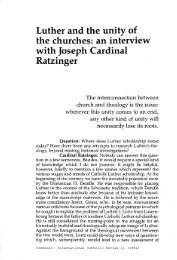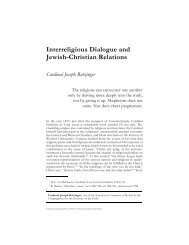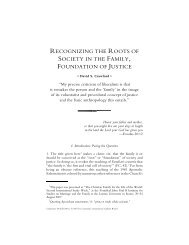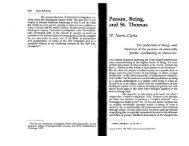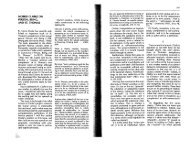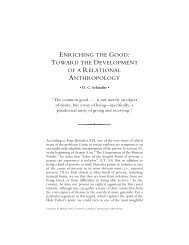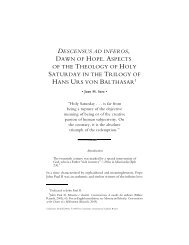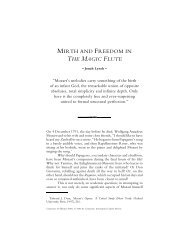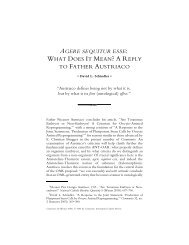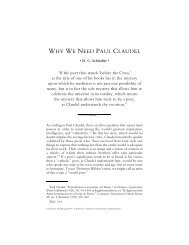Juan Sara. Secular Institutes According to Hans Urs ... - Communio
Juan Sara. Secular Institutes According to Hans Urs ... - Communio
Juan Sara. Secular Institutes According to Hans Urs ... - Communio
You also want an ePaper? Increase the reach of your titles
YUMPU automatically turns print PDFs into web optimized ePapers that Google loves.
<strong>Secular</strong> <strong>Institutes</strong> 329<br />
Schneider’s conception and configuration of reality were<br />
his<strong>to</strong>rical rather than systematic. He saw his<strong>to</strong>ry, moreover, as the place<br />
of the coming of God’s kingdom:<br />
The Christian life is never concerned only with souls but with<br />
the whole world, with the salvation of all men, and with the<br />
glorification of Christ by all and the return of all men <strong>to</strong> the<br />
Father through him: it is concerned with sharing in the<br />
accomplishment of his<strong>to</strong>ry. 49<br />
Now, for Schneider, the weight of a man, of a time, of his<strong>to</strong>ry<br />
itself is measured by the quality of their decisions. The cosmos becomes<br />
his<strong>to</strong>ry—his<strong>to</strong>ry as the image and the locus of the event of God’s<br />
decision for God on the cross of the Son. 50<br />
<strong>According</strong>ly, Balthasar’s study of Schneider’s work traces the<br />
decisions of the dominant peoples of the West as a succession of<br />
concrete forms of the “apocalypse” or unveiling of the European<br />
soul—in the light of the decision par excellence: the cross of the God-man<br />
between the Old and the New Covenants. 51 The degree of fullness<br />
reached by any his<strong>to</strong>rical figure (one who represents the whole of a<br />
people or a community) is conditional upon how intimately he<br />
approaches, and how intensely he shares in, the divine-human decision<br />
of the Lord of his<strong>to</strong>ry.<br />
49 Reinhold Schneider, Das Heilige in der Geschichte (Heidelberg, 1947), 13; cited<br />
in Balthasar, Tragedy Under Grace, 24.<br />
50 “The weight of a man, of a time, of his<strong>to</strong>ry as a whole is weighed from the<br />
peak of the decisions taken; and all that is in the world and in nature (although<br />
these remain fallen nature and guilty world in the concreteness of his<strong>to</strong>ry) is<br />
material and presupposition for the decision. In this sense, the principle that gratia<br />
supponit naturam holds good for the his<strong>to</strong>rian Schneider. Far from bringing about<br />
a harmony that would dispense from the contradiction of the Cross, the encounter<br />
of these realities can take place only in the Cross” (Balthasar, Tragedy Under Grace,<br />
27).<br />
51 Balthasar’s first great trilogy, the Apocalypse of the German Soul (1937–1939),<br />
already traces the unveiling of the decisions of figures representative (in<br />
Balthasar’s strong sense) of the German soul—decisions of that soul (portrayed in<br />
the “myth” of Prometheus and Dionysus) for the God of the Crucified or for<br />
itself. Nietzsche sums up the either-or in its most extreme form: Dionysus or the<br />
Crucified. This either-or cannot be resolved by a judgment from the outside, but<br />
only by an existential accompaniment of the decisive figures in order <strong>to</strong> help the<br />
soul confront, and confess <strong>to</strong>, the crucified God who comes <strong>to</strong>ward it.



